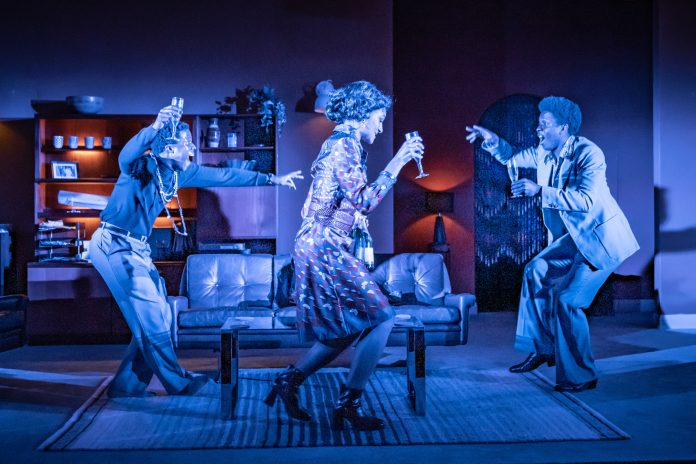
Let’s get this out of the way: at a time when ‘The Pandemic’ is still an issue, social distancing protocols, comfort and safety are uppermost in peoples’ minds. I found the trip to Hampstead Theatre was absolutely exemplary. The use of space and distance, health protocols, signage – as well as the helpfulness and quality of service from staff – were all top-notch.
If this country’s theatre institutions, practitioners and / or individuals are to survive this ‘perfect storm’ of Corona, Brexit’s coming economic chaos and a political regime that appears to be leading via ‘1984-for-beginners’, then all those wishing to remain involved in theatre need to get it right. Not least among these decisions, and considerations – for writers, producers, venues and potential audience-members – is content (i.e. ‘what’ and ‘why’).
For those who rely upon the creative arts – not just for ‘economic stability’, but to make sense of the world (‘where’ and ‘how’) – this piece seems an odd choice (unfulfilled lockdown contracts notwithstanding); not just in respect to attracting previous attendees, but in enticing new ones.
The titles of some films or stage plays can seem so iconic – so ubiquitous – that we sometimes convince ourselves that we ‘must have seen’ some iteration of the piece, at some point.
Alfred Fagon’s The Death of a Black Man is one of these such titles. Of course, as this play hasn’t been on the London stage since 1975, this certainly cannot be the case.
It starts in 1973 at a cricket’s crease, with a 20-something year old Black man delivering a monologue about Jamaican legend’s ubiquitousness as a symbol for ‘batting away’ white, patriarchal oppression. ‘Shakie’ (Toyin Omari-Kinch) is a London ‘wide boy’. Some would call him ‘hustler’ – though not himself. He would balk at the ethnically charged presumptions laid bare in that description; just as he exploits them all, in his amoral pursuit of sex, money, accommodation, class-status and – ultimately – self-worth.
The set and narrative is opened up as he is visited by ‘Jackie’ (Natalie Simpson). Although his elder by 13 years, Jackie is a woman referred to dismissively as his ‘baby-mother’. This is a term that hasn’t aged well in the almost-50 years since this play was set, and its reductive aspect is barely mitigated here.
I found the trip to Hampstead Theatre was absolutely exemplary. The use of space and distance, health protocols, signage – as well as the helpfulness and quality of service from staff – were all top-notch.
Their initial meeting is faux-polite; she pretends that she’s just passing through, and that she’s not emotionally invested in him having ‘grown up’ in the three years since their sexual relationship, when he was 15 years old. He, himself, appears insouciant – even when enquiring about the resulting baby, his daughter ‘Priscilla’.
By still relating to her as a receptacle for his bragging, grand schemes, petty rages and duplicitousness, it is clear that he still views her as little more than a warm vessel in which to store his misogynistic bile… and (potentially) other, equally accessible, bodily fluids.
It soon became a monotonous succession of mild abuse, (barely funny) quips, immature braggadocio, barely-nuanced generalisations on class, gender and race, and painful non sequiturs – the repetitive of which often stop the conversation dead in its tracks.

Indeed, the disconnection between the characters’ dialogue became so bad that – especially when Shakie’s old school-friend arrives to visit – one wonders whether the piece might have been better written as 3 separate monologues.
Played with requisite energy by Toyin Omari Kinch, Stumpie reinforces the theory about ‘crowds’ and ‘company’; destroying the intimacy by adding his poorly thought-out suggestions-for-life; most of which are rife with misogyny and racial insensitivity.
Indeed, all the cast perform admirably, but are hamstrung by the dialogue; as is director Dawn Walton. But when the dialogue just turns into vapid pronouncements about how ‘Black People need to return to Africa, ‘Black women don’t support Black men’, and ‘Black men are just wicked…wicked’ – and not in a hip (hop), post-modern way – it becomes a chore to keep the mask on.
All the cast perform admirably.
Ultimately, it made me question the reason for reviving an old play, unless it illuminates the view of the past, clarifies prevailing aspects of our existing present, or shows a way into an uncertain future? This play does none of these things; I just hope that the majority of the audience enjoyed the trip to the venue as I did.


























